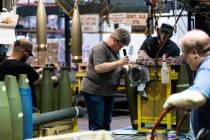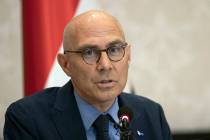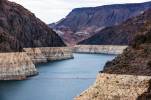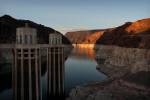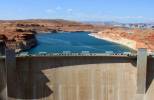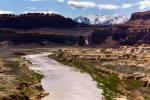Mulroy advice for Obama: Tap Mississippi floodwaters
If the federal government wants a surefire way to create jobs and stimulate the economy, Pat Mulroy has a suggestion to make: Why not study and build the largest water diversion project in American history?
The general manager of the Southern Nevada Water Authority said now may be the time to take a serious look at a decades-old idea of capturing floodwater from the Mississippi River and using it to recharge the massive groundwater aquifer beneath the Central Plains.
In terms of jobs and investment, the project would dwarf the Hoover and Glen Canyon Dams, and some believe it could secure the future water supply for a vast swath of the Midwest and West, including Nevada and six other states that share the Colorado River.
Mulroy plans to float her suggestion in Washington, D.C., today, during a panel discussion at the Brookings Institution on shoring up the nation's infrastructure.
This will be the 10th in a series of events organized by Brookings to make policy recommendations and advice to President-elect Barack Obama and his transition team.
Today's forum will result in a "memo to the president" on why and how to invest in infrastructure as part of an economic stimulus package and beyond.
"It's the best opportunity to come along," Mulroy said. "We've ignored our infrastructure for decades."
She is the only panelist from the West, and the only representative from a water agency.
"When you look at the stimulus package, there is very little in there for large municipal water utilities and the water issue in general," she said.
Instead, transportation dominates, and Mulroy said she can certainly understand why. But no amount of road work will matter if America's plumbing is allowed to degrade and collapse, she said.
Without available water, "you can stop building roads (to places) because nobody's going to live there," she said.
Years of study and discussion are needed before any effort is made to collect Mississippi River floodwater and use it to replenish the Ogallala Aquifer, which covers some 174,000 square miles and includes portions of eight states from Texas to South Dakota.
The necessary facilities could take a decade or more to construct.
But Mulroy said such a project, or one like it, could create tens of thousands of jobs and inject many billions of dollars into the economy.
It also could set off a daisy chain of smaller water projects and exchanges from east to west, allowing residents in Denver and farmers across the eastern flank of the Rockies to relinquish the water they currently pump across the Continental Divide. That in turn would leave more water for the Colorado River.
Short of dismantling the sprawling cities and massive economies that now dot the arid West, Mulroy said the only way to save the Colorado is to find more water to fill it.
Many predict climate change will only make things worse.
"We can't conserve our way out of a massive Colorado River drought. We can't desalt our way out of a massive Colorado River drought," Mulroy said. "If the West is growing drier and the Midwest is growing wetter, I see that as an opportunity."
She stressed that she isn't talking about tapping the Great Lakes or infringing on anyone's water rights. Only floodwater would be captured from the Mississippi, something that could benefit those who live near its banks.
Mulroy considers the idea "an investment in the future," much like the interstate highway system was in the 1950s.
"What you're doing is securing the underpinnings of our economy into the future, when it re-emerges," she said.
Mulroy's selection to the Brookings panel has drawn fire from at least one outspoken critic of the water authority and its plans to pump groundwater to Las Vegas from across hundreds of miles of eastern Nevada.
Bob Fulkerson, director of the Progressive Leadership Alliance of Nevada, said he was "highly disappointed" in Brookings for picking Mulroy and providing her with an opportunity to influence the water policies of the Obama administration.
"I just hope Pat Mulroy doesn't go there claiming we need billions of dollars to dry out rural Nevada. It kind of confirms our worst fears."
Mulroy said she has no intention of using today's forum to try to wrangle stimulus money for the authority's multibillion-dollar pipeline project in Nevada.
"That's a local issue and a state issue. It doesn't rise to the level of federal discussion," she said.
But Mulroy wouldn't be doing her job if she didn't try to get her hands on some of the federal money that may be earmarked for infrastructure.
Mulroy said one local project she could use a little federal help with is the so-called third straw the authority is building to reach water deep in Lake Mead.
The third intake is expected to cost at least $817 million and take four years to complete.
Contact reporter Henry Brean at hbrean @reviewjournal.com or 702-383-0350.













